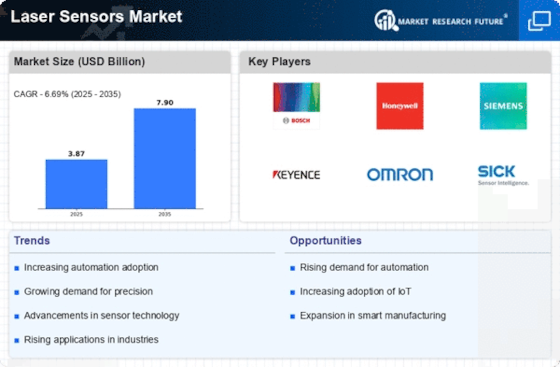Top Industry Leaders in the Laser Sensors Market

Competitive Landscape of the Laser Sensor Market:
The global laser sensor market is experiencing a surge in demand driven by automation, Industry 4.0, and the burgeoning Internet of Things (IoT). This dynamism translates into a fiercely competitive landscape, where established giants and nimble startups jostle for market share. Understanding the strategies, key players, and future trends is crucial for any company aiming to carve a niche in this photon-powered domain.
Key Players:
- Rockwell Automation
- Omron Corporation
- Banner Engineering Corporation
- Panasonic Corporation
- Opted Group
- Schmitt Industries Inc
- Keyence Corporation
- if Electronic
- Laser Technology, Inc
- WayCon Positionsmesstechnik GmbH
- SmartRay GmbH
- Techno Instruments
- Micro-Epsilon
- LAP GmbH
Strategies Adopted by Key Players:
Established players, like SICK, KEYENCE, and Panasonic, leverage their extensive product portfolios, strong brand recognition, and robust distribution networks to maintain their leadership positions. They invest heavily in R&D, focusing on miniaturization, improved accuracy, and integration with AI and IoT platforms.
Challengers like Micro-Epsilon and Baumer are carving niches by specializing in high-precision sensors for specific applications, often in partnership with OEMs. They compete on the basis of technical expertise and customized solutions, catering to demanding industrial automation needs.
Startups like Quanergy and Velodyne are disrupting the scene with innovative LiDAR technologies for autonomous vehicles and robotics. Their agility and focus on disruptive technologies allow them to challenge established players in specific segments.
Beyond these, a wave of Asian manufacturers is emerging, fueled by lower production costs and government initiatives. Chinese companies like ZYGO and Sunny Optical are offering cost-effective alternatives, catering to price-sensitive segments.
Market Share Analysis:
Analyzing market share in the laser sensor space requires a multi-layered approach. While traditional metrics like revenue and unit shipments hold value, deeper insights emerge from considering:
- Sensor Type: The market encompasses diverse sensor types, from LiDARs for autonomous vehicles to time-of-flight sensors for industrial automation. Dominance in one segment doesn't guarantee leadership in another.
- Application Focus: Laser sensors serve various industries, from automotive and consumer electronics to manufacturing and infrastructure. Companies excelling in one application might not be prominent in others.
- Technological Prowess: Innovation is paramount in this fast-paced market. Players with advanced capabilities in laser technology, signal processing, and miniaturization hold an edge.
- Geographical Footprint: Regional variations in demand and regulations influence market share. Companies with strong presences in key growth markets like Asia-Pacific can outperform rivals focused solely on mature markets.
New Frontiers and Evolving Dynamics
The laser sensor market is constantly evolving, with several trends shaping the competitive landscape:
- Miniaturization and Integration: Smaller, more integrated sensors are enabling applications in wearables, drones, and smart homes. Companies focused on miniaturization are poised to benefit.
- Fusion Technologies: Combining laser sensors with cameras, radar, and ultrasonic data is enhancing accuracy and perception capabilities. Players adept at sensor fusion will gain an edge.
- Software and Services: Software for data analysis, calibration, and sensor management is becoming increasingly critical. Companies offering comprehensive software solutions will stand out.
- Cybersecurity Concerns: As laser sensors become more interconnected, cybersecurity vulnerabilities emerge. Companies with robust security features will attract security-conscious customers.
Industry Developments
Rockwell Automation:
- July 2021: Collaborated with Kezzler AS, a cloud-based product digitalization and traceability platform, to enable manufacturers to track their product's journey using laser sensors for identification and data capture.
- February 2019: Launched the Allen-Bradley 42AF RightSight M30 photoelectric sensor, designed for long-distance detection and improved environmental resistance in industrial applications.
- Ongoing focus: Developing smart sensors with integrated intelligence and connectivity for predictive maintenance and Industry 4.0 solutions.
Omron Corporation:
- October 2023: Released the ZM series time-of-flight laser sensors with high accuracy and precision for distance measurement and object detection in robotics, logistics, and automotive applications.
- June 2023: Announced the FH series 2D LiDAR sensors for collision avoidance and navigation in mobile robots and autonomous vehicles.
- September 2022: Introduced the FH-S series compact LiDAR sensors for space-constrained applications like AGVs and collaborative robots.
- Ongoing focus: Expanding LiDAR sensor portfolio and collaborating with partners to develop AI-powered sensor solutions for autonomous systems.









